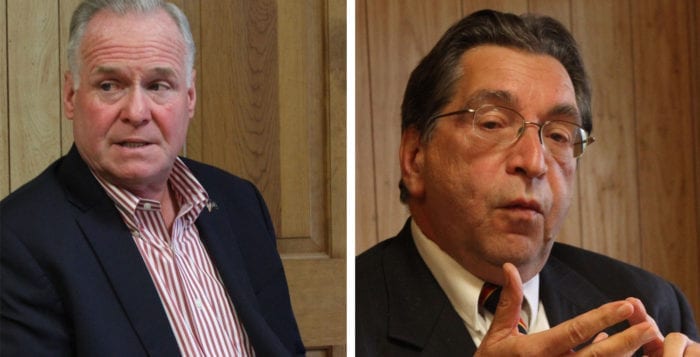Fitzpatrick seeks eighth term in Assembly against Kings Park resident

Incumbent Assemblyman Mike Fitzpatrick (R-St. James) will square off against Kings Park resident and Democrat Rich Macellaro on Election Day for the right to oversee the district that spans Smithtown Town and a portion of northern Islip. Macellaro has made unsuccessful bids for office, first in the Assembly in 2010 then for a Smithtown Town board seat in 2013. The two sat down for an interview in the TBR News Media main office.
During his 14 years in the Assembly, Fitzpatrick has sponsored legislation to establish a two percent property tax levy increase cap for school districts and to cap pensions for elected officials as a means to stave off financial hardships for the state. Macellaro prided himself on his work with civic and community organizations and projects in Smithtown, and his ability to bring a new set of eyes to a district in need of change.
“There are some storm clouds on the horizon. The lack of jobs, the lack of housing — I think the stress that life on Long Island puts on people, on families, maybe people are using as an outlet.”
— Mike Fitzpatrick
High property taxes and swollen government budgets have contributed to a litany of issues specific to the 8th district, but also to the region as a whole, according to Fitzpatrick. Some of those issues include a cost of living far higher than most of the nation, and fewer high paying local careers as an incentive to keep young people here after graduation. He also suggested the community’s high rates of opioid- and heroin-related deaths could be a byproduct of the tough economic times in his district.
“There are some storm clouds on the horizon,” Fitzpatrick said. “The lack of jobs, the lack of housing — I think the stress that life on Long Island puts on people, on families, maybe people are using as an outlet. Obviously they are.”
Fitzpatrick was also involved in the passing of a series of bills earlier this year designed to combat addiction on the North Shore and beyond. As a result, insurers must cover the costs of life-saving Narcan to families with individuals suffering from substance abuse. Substance abusers are now offered 72 hours of emergency treatment, instead of 48 hours, so they can be stabilized and connected to longer-term addiction treatment options while also balancing the individual rights of the incapacitated individuals, among other benefits.
Macellaro said he believes penalties for dealers could be harsher, though it is not the only possible solution to the problem.
“We need to have increased penalties for drug traffickers and dealers, and we also need to get those folks who, unfortunately, for whatever reason, become addicted to opiates — we need to get them immediate rehabilitative services.”
“The two percent tax cap is great because it forced government into reducing their costs. We have to do anything possible to prevent any increase in property taxes.”
— Rich Macellaro
The Assemblyman said he believes in the “invisible hand” as a means of economic development, meaning government policies cause more harm than good in the private sector, and called the statewide START-UP NY stimulus program a failure.
“Government-directed economic development does not work,” he said.
Macellaro has a different, if outside-the-box, plan for economic development through a measure that would lower property taxes.
“I think now is the time to look at how we rein in the cost of providing education in Suffolk County and Nassau County, of which there are 124 school districts,” he said. “There are 13 towns in Nassau and Suffolk — three in Nassau, 10 in Suffolk. My proposal is simple: one school district per town. So from 124 school districts, we’ll get down to around 13.”
He said the idea would allow districts to pay for services like maintenance, athletic fields, security and even administrators in “bulk.” He strongly supported legislation to cap increases to property taxes.
“The two percent tax cap is great because it forced government into reducing their costs,” he said. “We have to do anything possible to prevent any increase in property taxes.”






